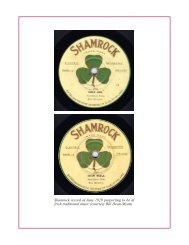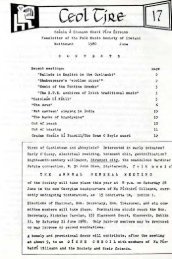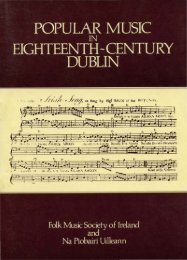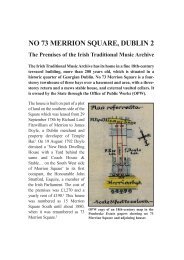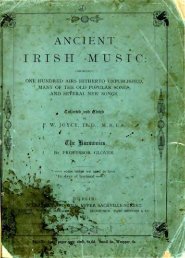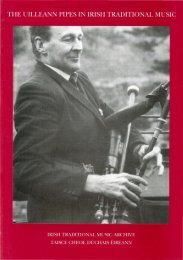Union Pipes - Irish Traditional Music Archive
Union Pipes - Irish Traditional Music Archive
Union Pipes - Irish Traditional Music Archive
Create successful ePaper yourself
Turn your PDF publications into a flip-book with our unique Google optimized e-Paper software.
17 COURTNEY’S ‘UNION PIPES’ AND THE TERMINOLOGY OF IRISH BELLOWS-BLOWN BAGPIPES<br />
In 1766 a blind professional musician Mr James Mullin had come<br />
from London to Derby to perform ‘Several Extraordinary Pieces of<br />
<strong>Music</strong> on the <strong>Irish</strong> Bagpipes, German flute and Violin’. 37 The Scot<br />
James Tytler, editor in Edinburgh of the second edition of the<br />
Encyclopaedia Britannica, played on the ‘<strong>Irish</strong> pipes’ according to<br />
his friend the poet Robert Burns, 38 and Tytler would have been<br />
speaking from personal experience when he also applies this term to<br />
the instrument in 1778, and describes it in the Encyclopaedia as the<br />
‘softest, and in some respects the most melodious of any’ bagpipes. 39<br />
From about 1765 to the end of the century London and other musical<br />
instrument sellers are regularly advertising two kinds of bagpipes –<br />
‘Bagpipes, Scotch or <strong>Irish</strong>’ – for sale, 40 and some claim to be making<br />
them. 41 By 1779, less than a decade before Courtney appears in<br />
the contemporary <strong>Irish</strong> pipes he refers to were more ‘variegated’ or varied than<br />
these, they would have had a range comparable to that of Geoghegan’s ‘new or<br />
pastoral’ instrument, and probably, like it, have had a capability for producing<br />
various semitones by crossfingering. They may even have been Geoghegan’s<br />
instrument; he was <strong>Irish</strong>, and it is an open question whether his pipes were seen<br />
as <strong>Irish</strong> in Scotland in 1760. By ‘other <strong>Music</strong>k’ MacDonald doubtless meant the<br />
kind of popular classical music he had just been writing about, by such<br />
composers as Corelli, Festing and Handel.<br />
37<br />
Derby Mercury, Derby, 19 Sept. 1766.<br />
38<br />
R.H. Cromeck, Reliques of Robert Burns, quoted in Stewart 2009: 79.<br />
39<br />
[Tytler] 1778: 954.<br />
40<br />
See Halfpenny 1964: 100–101 for a 1765 Robert Bremner advertisement;<br />
Bath Chronicle and Weekly Gazette, Bath, 17 Aug. 1769, for a Thomas<br />
Underwood advertisement; Gazeteer and New Daily Advertiser, London, 13<br />
June 1770, for a Henry Thorowgood advertisement; and A Catalogue of Vocal<br />
and Instrumental <strong>Music</strong>... John Welcker [c. 1775]; etc.<br />
41<br />
John Welcker [c. 1775] for example: ‘John Welcker... Manufactures and Sells<br />
the following Instruments... Bagpipes Scotch or <strong>Irish</strong>... Bagpipe [reeds]...’ (in<br />
catalogue of Note 40). Welcker lists so many instruments of his manufacture<br />
that it might be suspected that he is factoring them for other manufacturers, but<br />
he also gives a separate list of instruments that he only imports (including<br />
‘Welch Harps’ and ‘<strong>Irish</strong> Harps’).



